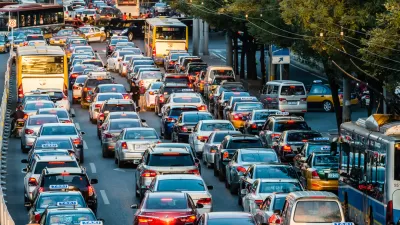Despite efforts to clean up Beijing during last year's Olympic Games, pollutant reductions were very minor, according to a new report.
"Beijing sits in a soupy haze of pollution from nearby factories, coal-fired power plants, and traffic that increases dramatically by the day, making the city one of the most air polluted in the world. China spent billions of dollars trying to control emissions that could hinder athlete's performances on game day. From 20 July to 20 September 2008, the Chinese government temporarily closed factories and regulated the number of cars on the road in Beijing and in nearby areas, all with the hopes of curbing aerosols--fine particles suspended in the atmosphere. China tried a similar traffic strategy in 2006 during a 3-day political summit and achieved 40% to 60% reductions in aerosol concentrations, according to one study. But this study covered only a short period and concentrated on aerosols at ground level, not throughout the larger atmosphere. For the 2008 Olympics, Chinese officials called for reductions of 60% to 70% in automobile emissions and up to 30% in industrial emissions."
"...It turns out that the Chinese only achieved a modest reduction in aerosols. The researchers report in a paper in press in Geophysical Research Letters that pollution-control efforts reduced the overall amount of aerosols in the atmosphere by about 10% to 15%. That small change highlights the importance of factors such as wind direction in determining local pollution, says Cermak. In spite of the reduction in local emissions, winds from the south and southeast sullied Beijing's air by bringing in pollution from distant industrial areas, he says."
FULL STORY: China Falls Short on Olympic Cleanup

Planetizen Federal Action Tracker
A weekly monitor of how Trump’s orders and actions are impacting planners and planning in America.

San Francisco's School District Spent $105M To Build Affordable Housing for Teachers — And That's Just the Beginning
SFUSD joins a growing list of school districts using their land holdings to address housing affordability challenges faced by their own employees.

The Tiny, Adorable $7,000 Car Turning Japan Onto EVs
The single seat Mibot charges from a regular plug as quickly as an iPad, and is about half the price of an average EV.

With Protected Lanes, 460% More People Commute by Bike
For those needing more ammo, more data proving what we already knew is here.

In More Metros Than You’d Think, Suburbs are Now More Expensive Than the City
If you're moving to the burbs to save on square footage, data shows you should think again.

The States Losing Rural Delivery Rooms at an Alarming Pace
In some states, as few as 9% of rural hospitals still deliver babies. As a result, rising pre-term births, no adequate pre-term care and "harrowing" close calls are a growing reality.
Urban Design for Planners 1: Software Tools
This six-course series explores essential urban design concepts using open source software and equips planners with the tools they need to participate fully in the urban design process.
Planning for Universal Design
Learn the tools for implementing Universal Design in planning regulations.
Smith Gee Studio
City of Charlotte
City of Camden Redevelopment Agency
City of Astoria
Transportation Research & Education Center (TREC) at Portland State University
US High Speed Rail Association
City of Camden Redevelopment Agency
Municipality of Princeton (NJ)



























